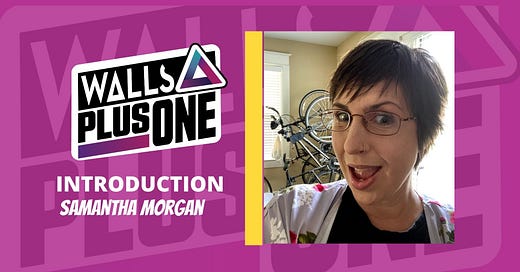Well hello there! I’m so glad you made it! I wasn’t sure if you would, seeing as how you have literally millions of podcasts to choose from. So thank you. Now let me tell you a bit about what we do here.
I should probably start by telling you who I am. My name is Samantha Morgan and I’ll be your host for this first season of Walls + 1. I am a former journalist turned non-profit warrior. I say warrior because a lot of the time this work can feel like a fight. And I’m new to this whole industry so I’m learning as I go. That’s why I wanted to spend this first season talking to some of the veterans in the industry.
There are so many people doing incredible work to address the big issues like equal pay, affordable housing, predatory lenders, and I want to learn as much from them as possible.
The first episode is with my absolute favorite human. Her name is Sherreta R. Harrison. She works with an organization called MetroMorphosis. Their mission statement is to transform urban communities from within. Whoa! Yeah, that’s some heavy stuff.
I first heard Sherreta, and pretty much every person you’re going to hear from this season, on Zoom. I mean, everything’s been on zoom during the pandemic, right. Well, this particular zoom series is a direct result of the pandemic.
Take a trip with me in the wayback machine to March 2020. If you’ll recall, we were all sent home for a week, maybe two. We were going to wait for this whole “Covid” thing to blow over and then we’d get back to our lives.
You know where the story goes from there.
So our fearless leader here at the Walls Project, Executive Director Casey Phillips joined up with the folks at Metromorphosis to host a weekly meeting. The purpose was to help all of the awesome nonprofits keep their momentum going in the middle of a pandemic.
This has been happening ever since. Every Friday, local leaders speak on a topic that relates to those things that keep people in poverty.
These talks are so inspiring I quit my job! I was working in the commercial sector, but I was so inspired by the things I was hearing week to week that I wanted to jump in and be part of it. As a journalist, you spend a lot of time on the sidelines. I was ready to get my hands dirty and be part of the game.
So, here I am! In September 2021, I joined the Walls Project, and I suggested we start a podcast. And Thankfully, the team said yes! Not only that, they're all incredibly supportive.
Tada! You’re all caught up! Now you know how we got here today. Let me tell you a little bit about where we’re going.
Earlier I mentioned the first episode with Sherreta. She’s going to talk about equal pay. Why should women make as much as men? Why shouldn't they! But easier said than done. There are a lot of reasons why this has been such a fight and although we don’t get into all of them we do touch on a lot.
This American life that we live is really based on systems that were designed in such a way to protect certain values we had as a country. And so, if you look back all throughout history you can identify what those values are. The patriarchy and whiteness being at the top of those lists. And so when you think about systems and how people can be systemically or systematically shut out of things; let’s just take one of the cornerstones of the American Dream - homeownership. Between how suburbs were built, how neighborhoods were built, between how interstate systems run through and disrupt entire communities, you can see how that has, quiet physically, shut people out of spaces. So that’s what I mean by systemically being denied. People of color have been denied home loans and so they can’t then participate in homeownership, which then leads into this wealth gap that we’re seeing, and so even though we’re talking about equal pay, equal pay is part of this just wealth gap that exists in this country and that wealth gap is typically depicted through race and while the equal pay is depicted through gender and so imagine what happens when you’re at the intersection of a certain race and a certain gender.
If that doesn’t get you interested in hearing more, you’re in the wrong place my friend. But if you’ve made it this far, then I’m pretty sure you’re ready to hear more.
So, let me introduce you to another guest coming up later this season. His name is Jan Moller. He’s a former journalist, just like me! He went from writing about the things happening at the state capitol to being a nonprofit ambassador at the state capitol. I mean, we’re twins, basically.
When you cover the things at the state capitol, one of the things that always struck me a lot was that the people who are doing well in Louisiana - the industries that are doing well, the ones that have power and money are extremely well represented in the corridors of power . The people who really need the government to work for them, the folks who have low incomes, who are at the margins of society, who struggle to get by financially week to week, they aren’t represented in those hallways very well. They’re too busy working, keeping their heads above water, to go to the capitol to advocate for what they need. So that’s where the non-profit sector comes in. That’s where my organization, groups like the Walls Project and others come in - is trying to provide analysis and facts, but to also advocacy on behalf of low income families on the policy front. And so I thought here is an opportunity to do research and advocacy that has more of a purpose than recording what happened yesterday, but to do so with a point of view and to do so with kinda a mission behind it. Again I’ve been just incredibly fortunate. I just keep waiting to get hit by a bus or have a piano fall on my head when I’m walking down the street because I’ve had this great fortune to have a career that I loved in newspapers, I don’t regret a day I spent in that business, to be followed by this different… similar.. I mean you use a lot of the same skills, but this very different, new career that really fell into my lap over a decade ago.
He is such an interesting and fascinating guy and I really enjoyed talking about the current state of media and where we think it’s going. Hint… this podcast is part of the future. Well, we hope it will be. That’s because we’re not just going to tell you what’s happening, we’re also going to give you a few things that YOU can do to make an impact. Here's a taste of the suggestion given by Alfredo Cruz when we were discussing issues surrounding housing.
I go again back to choices. We can choose to invest in something that we know has helped thousands of vulnerable families to keep that a permanent program because it both helps to stabilize families and it also helps landlords who then have to turn these properties around, repair them, put them back into the market, and they may not recover their rears that was owed to them, so that's a huge financial gap, financial loss for them. And so if you're a landlord, or property manager, just advocating for a permanent rental assistance program is one way. Who do you advocate to? Your council member, mayor's office, Louisiana Housing Corporation, your state legislature to do this at a state level...
Then we want you to weigh in and continue the conversation with us on our social media platforms. If you’re on Instagram, Facebook, or LinkedIn, make sure you’re following The Walls Project so you can be inside the conversation.
Speaking of being on the "inside," we’re putting all of the full podcast episodes here! If you're reading this, then you're in the right place. Here you will be able to listen to the uninterrupted version of each episode, and read the full transcript of the episode, if reading is more your style.
We created this section as one of the perks for being a Walls Project Insider. Your monthly contribution will go a long way to helping keep all of our programs moving forward. During this season, you'll also hear more about those programs.
So there we have it. You’re in the loop on the launch of Walls + 1. There will be some more surprises along the way, so make sure to follow along.
Catch you all next week…















Share this post